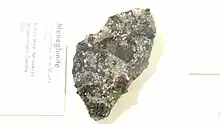Meneghinite
Meneghinite is a sulfosalt mineral with the chemical formula CuPb13 Sb7S24.[4]
| Meneghinite | |
|---|---|
| General | |
| Category | Sulfosalt mineral |
| Formula (repeating unit) | CuPb13 Sb7S24 |
| IMA symbol | Meg[1] |
| Strunz classification | 2.HB.05b |
| Crystal system | Orthorhombic |
| Crystal class | Dipyramidal (mmm) H-M symbol: (2/m 2/m 2/m) |
| Space group | Pbnm |
| Identification | |
| Color | Blackish lead-grey |
| Crystal habit | Prismatic to acicular, massive |
| Cleavage | {010} perfect |
| Fracture | Conchoidal |
| Tenacity | Brittle |
| Mohs scale hardness | 2+1⁄2 |
| Luster | Metallic |
| Streak | Black shining |
| Diaphaneity | Opaque |
| Specific gravity | 6.36 |
| Pleochroism | Weak |
| References | [2][3][4] |
In the orthorhombic crystal system, meneghinite has a Mohs hardness of 2+1⁄2, one perfect cleavage and a conchoidal fracture. It is a blackish lead-grey in colour and gives a black shining streak. Its lustre is metallic.[4]
Discovered in the Italian Province of Lucca in 1852,[4] it is named after Giuseppe Meneghini (1811–1889) of the University of Pisa, who first observed the species.[5] The Bottino Mine in Lucca is the type locality.[4]

Sample of Meneghinite from the Harvard Museum of Natural History
References
- Warr, L.N. (2021). "IMA–CNMNC approved mineral symbols". Mineralogical Magazine. 85 (3): 291–320. Bibcode:2021MinM...85..291W. doi:10.1180/mgm.2021.43. S2CID 235729616.
- Mineralienatlas
- http://rruff.geo.arizona.edu/doclib/hom/meneghinite.pdf Handbook of Mineralogy
- Mindat information page for Meneghinite
- The Brown Reference Group plc, ed. (2007). "Meneghinite". Treasures of the Earth. De Agostini UK Ltd. ISBN 978-0-7489-7995-0.
This article is issued from Wikipedia. The text is licensed under Creative Commons - Attribution - Sharealike. Additional terms may apply for the media files.